Psychology Report: Psychology Theories and Human Development Analysis
VerifiedAdded on 2020/06/05
|20
|5495
|69
Report
AI Summary
This report provides an overview of psychological theories related to life span development, examining how these theories apply to different life stages. It delves into the influence of social and biological factors on human behavior, analyzing how these factors shape individual development and personality. The report explores the importance of social needs in the context of health and social care, discussing the impact of social roles and norms on behavior. Furthermore, it analyzes the application of psychological theories to individuals, behavior disturbances, and mental disorders, evaluating their principles in affecting behavior change within health and social care settings. The report concludes by highlighting how psychological theories enhance the understanding of relationships in health and social care.
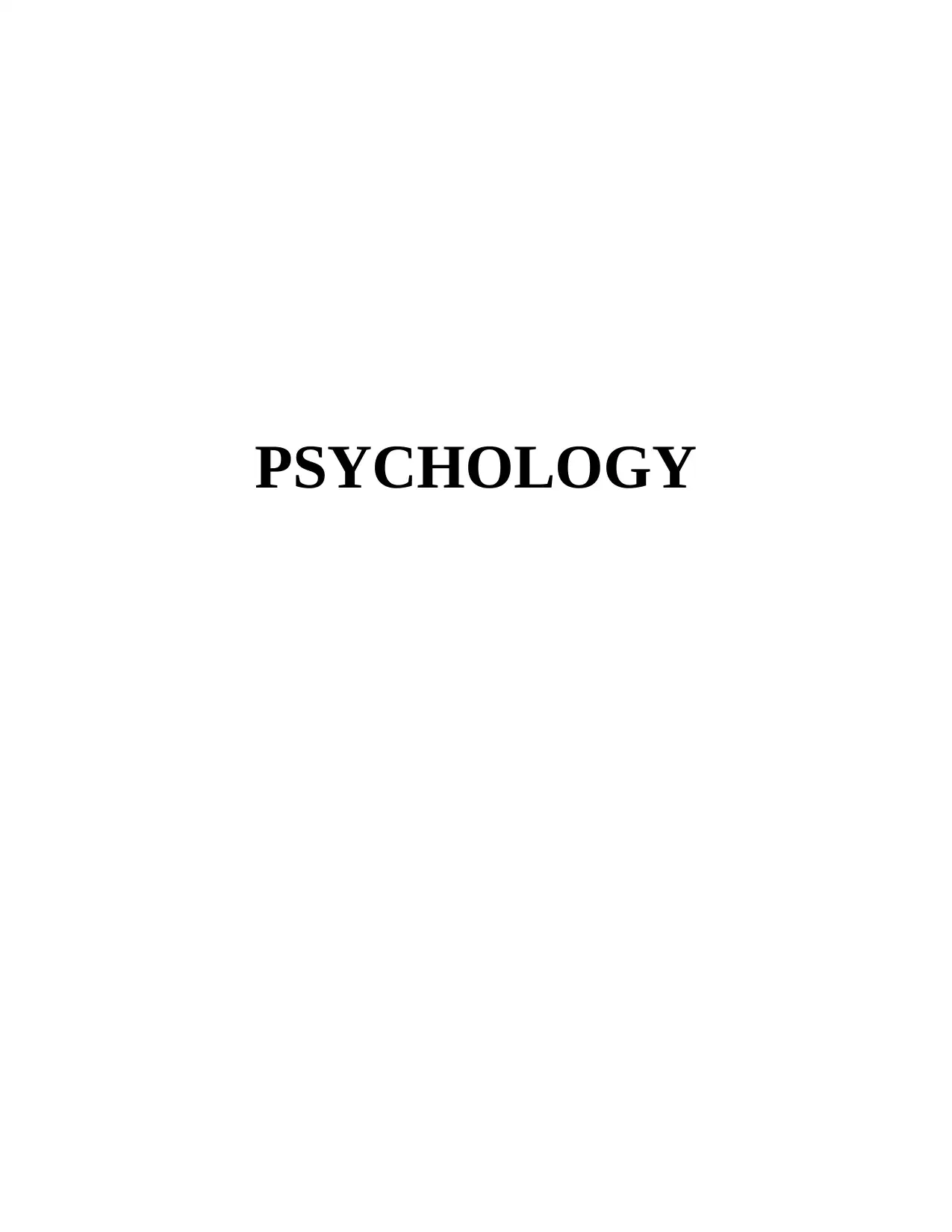
PSYCHOLOGY
Paraphrase This Document
Need a fresh take? Get an instant paraphrase of this document with our AI Paraphraser
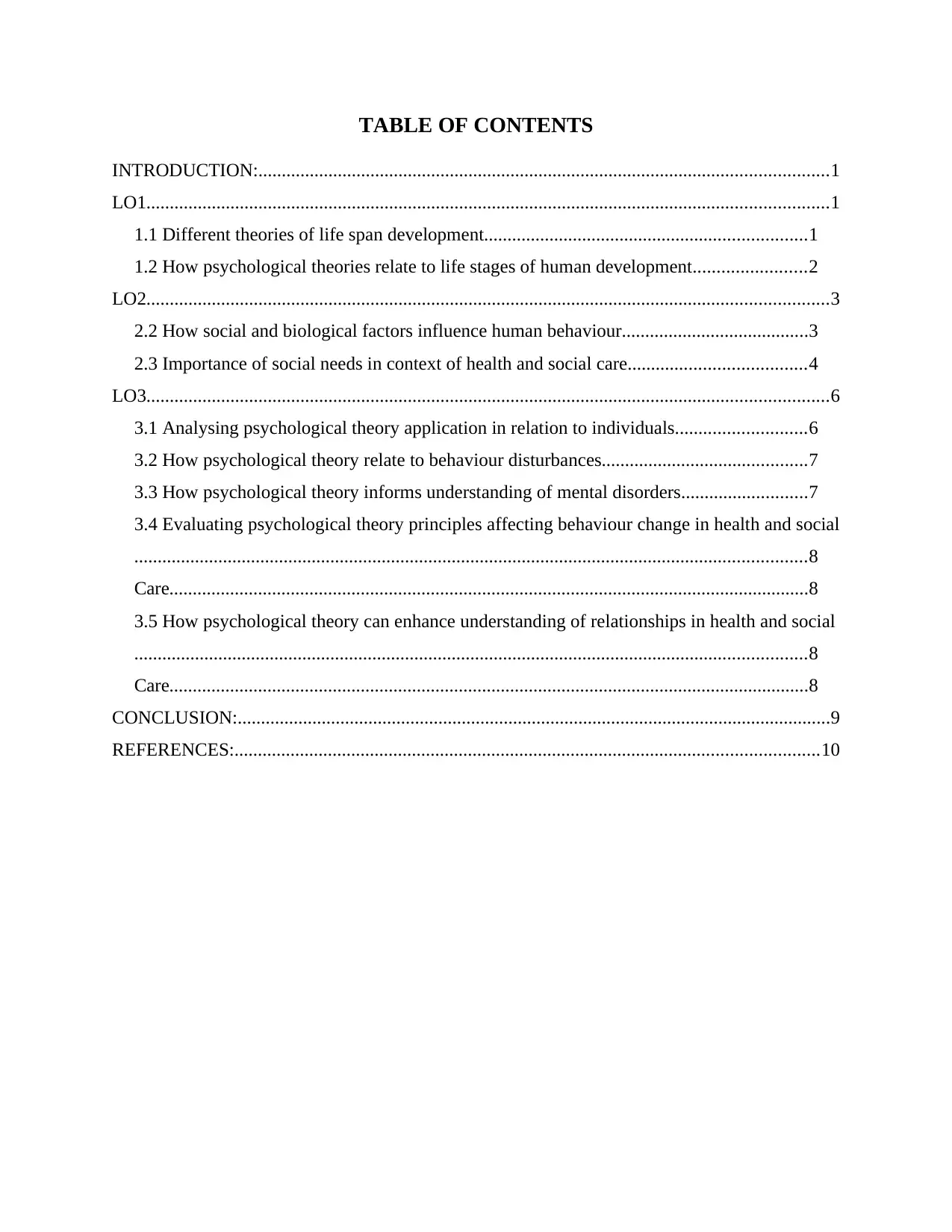
TABLE OF CONTENTS
INTRODUCTION:..........................................................................................................................1
LO1..................................................................................................................................................1
1.1 Different theories of life span development.....................................................................1
1.2 How psychological theories relate to life stages of human development........................2
LO2..................................................................................................................................................3
2.2 How social and biological factors influence human behaviour........................................3
2.3 Importance of social needs in context of health and social care......................................4
LO3..................................................................................................................................................6
3.1 Analysing psychological theory application in relation to individuals............................6
3.2 How psychological theory relate to behaviour disturbances............................................7
3.3 How psychological theory informs understanding of mental disorders...........................7
3.4 Evaluating psychological theory principles affecting behaviour change in health and social
................................................................................................................................................8
Care.........................................................................................................................................8
3.5 How psychological theory can enhance understanding of relationships in health and social
................................................................................................................................................8
Care.........................................................................................................................................8
CONCLUSION:...............................................................................................................................9
REFERENCES:.............................................................................................................................10
INTRODUCTION:..........................................................................................................................1
LO1..................................................................................................................................................1
1.1 Different theories of life span development.....................................................................1
1.2 How psychological theories relate to life stages of human development........................2
LO2..................................................................................................................................................3
2.2 How social and biological factors influence human behaviour........................................3
2.3 Importance of social needs in context of health and social care......................................4
LO3..................................................................................................................................................6
3.1 Analysing psychological theory application in relation to individuals............................6
3.2 How psychological theory relate to behaviour disturbances............................................7
3.3 How psychological theory informs understanding of mental disorders...........................7
3.4 Evaluating psychological theory principles affecting behaviour change in health and social
................................................................................................................................................8
Care.........................................................................................................................................8
3.5 How psychological theory can enhance understanding of relationships in health and social
................................................................................................................................................8
Care.........................................................................................................................................8
CONCLUSION:...............................................................................................................................9
REFERENCES:.............................................................................................................................10
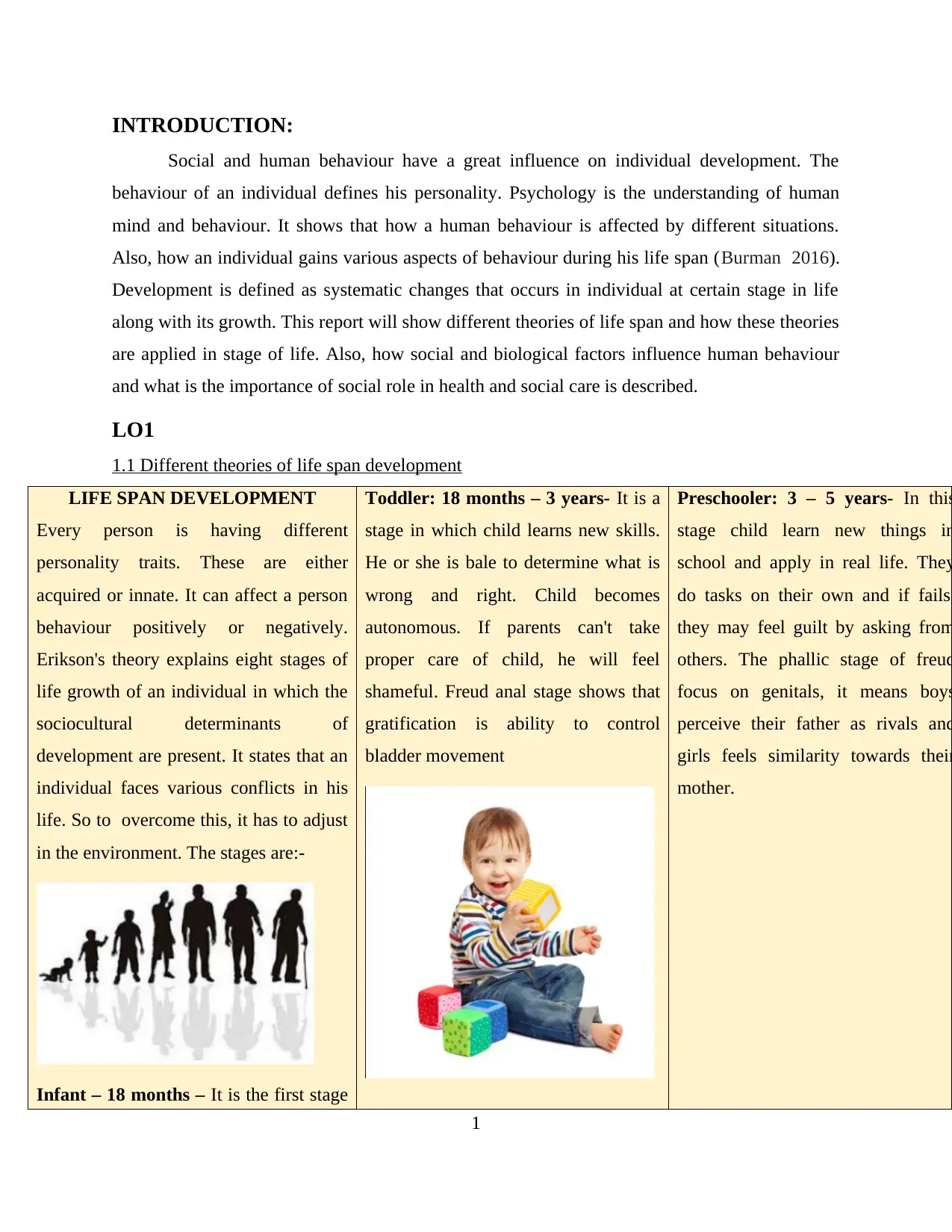
INTRODUCTION:
Social and human behaviour have a great influence on individual development. The
behaviour of an individual defines his personality. Psychology is the understanding of human
mind and behaviour. It shows that how a human behaviour is affected by different situations.
Also, how an individual gains various aspects of behaviour during his life span (Burman 2016).
Development is defined as systematic changes that occurs in individual at certain stage in life
along with its growth. This report will show different theories of life span and how these theories
are applied in stage of life. Also, how social and biological factors influence human behaviour
and what is the importance of social role in health and social care is described.
LO1
1.1 Different theories of life span development
LIFE SPAN DEVELOPMENT
Every person is having different
personality traits. These are either
acquired or innate. It can affect a person
behaviour positively or negatively.
Erikson's theory explains eight stages of
life growth of an individual in which the
sociocultural determinants of
development are present. It states that an
individual faces various conflicts in his
life. So to overcome this, it has to adjust
in the environment. The stages are:-
Infant – 18 months – It is the first stage
Toddler: 18 months – 3 years- It is a
stage in which child learns new skills.
He or she is bale to determine what is
wrong and right. Child becomes
autonomous. If parents can't take
proper care of child, he will feel
shameful. Freud anal stage shows that
gratification is ability to control
bladder movement
Preschooler: 3 – 5 years- In this
stage child learn new things in
school and apply in real life. They
do tasks on their own and if fails,
they may feel guilt by asking from
others. The phallic stage of freud
focus on genitals, it means boys
perceive their father as rivals and
girls feels similarity towards their
mother.
1
Social and human behaviour have a great influence on individual development. The
behaviour of an individual defines his personality. Psychology is the understanding of human
mind and behaviour. It shows that how a human behaviour is affected by different situations.
Also, how an individual gains various aspects of behaviour during his life span (Burman 2016).
Development is defined as systematic changes that occurs in individual at certain stage in life
along with its growth. This report will show different theories of life span and how these theories
are applied in stage of life. Also, how social and biological factors influence human behaviour
and what is the importance of social role in health and social care is described.
LO1
1.1 Different theories of life span development
LIFE SPAN DEVELOPMENT
Every person is having different
personality traits. These are either
acquired or innate. It can affect a person
behaviour positively or negatively.
Erikson's theory explains eight stages of
life growth of an individual in which the
sociocultural determinants of
development are present. It states that an
individual faces various conflicts in his
life. So to overcome this, it has to adjust
in the environment. The stages are:-
Infant – 18 months – It is the first stage
Toddler: 18 months – 3 years- It is a
stage in which child learns new skills.
He or she is bale to determine what is
wrong and right. Child becomes
autonomous. If parents can't take
proper care of child, he will feel
shameful. Freud anal stage shows that
gratification is ability to control
bladder movement
Preschooler: 3 – 5 years- In this
stage child learn new things in
school and apply in real life. They
do tasks on their own and if fails,
they may feel guilt by asking from
others. The phallic stage of freud
focus on genitals, it means boys
perceive their father as rivals and
girls feels similarity towards their
mother.
1
⊘ This is a preview!⊘
Do you want full access?
Subscribe today to unlock all pages.

Trusted by 1+ million students worldwide
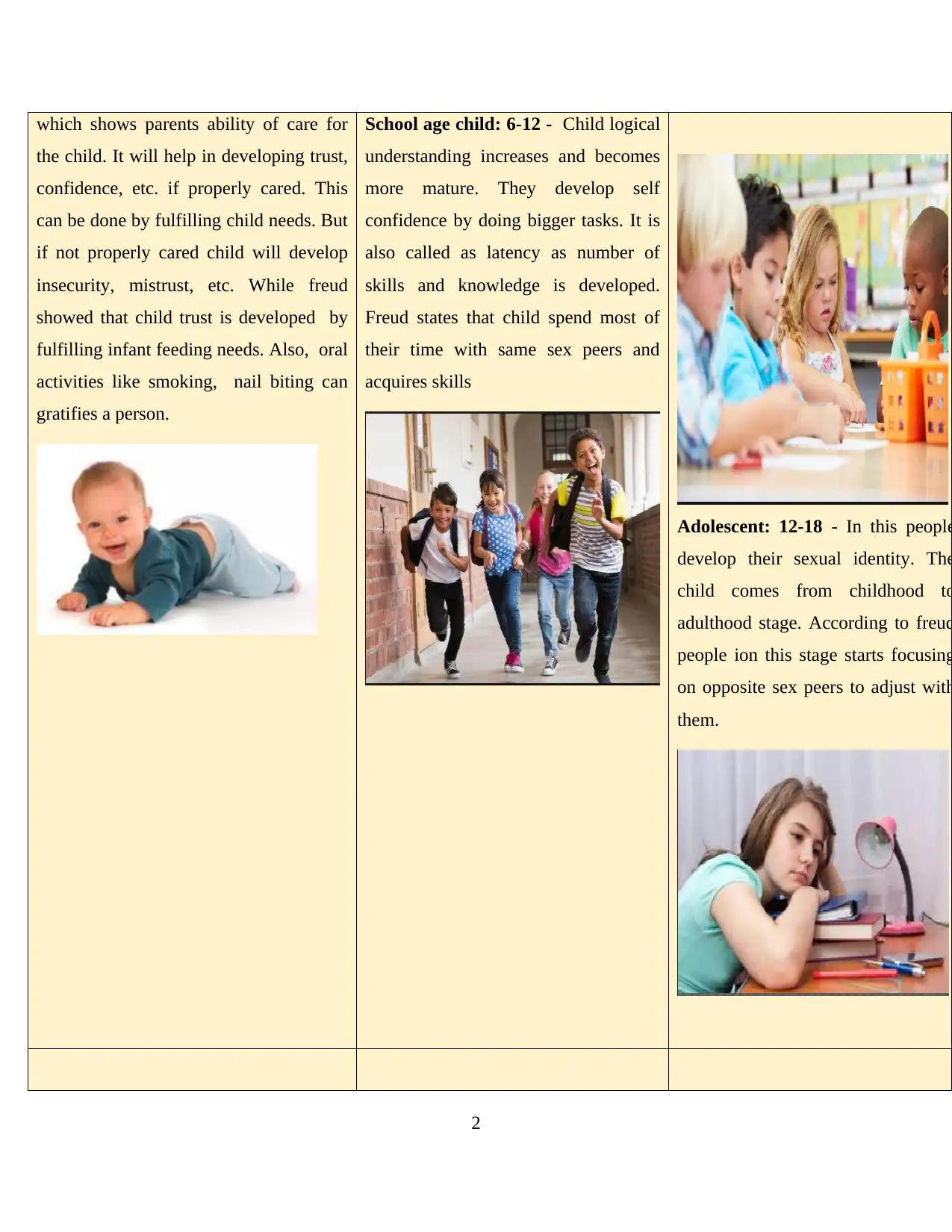
which shows parents ability of care for
the child. It will help in developing trust,
confidence, etc. if properly cared. This
can be done by fulfilling child needs. But
if not properly cared child will develop
insecurity, mistrust, etc. While freud
showed that child trust is developed by
fulfilling infant feeding needs. Also, oral
activities like smoking, nail biting can
gratifies a person.
School age child: 6-12 - Child logical
understanding increases and becomes
more mature. They develop self
confidence by doing bigger tasks. It is
also called as latency as number of
skills and knowledge is developed.
Freud states that child spend most of
their time with same sex peers and
acquires skills
Adolescent: 12-18 - In this people
develop their sexual identity. The
child comes from childhood to
adulthood stage. According to freud
people ion this stage starts focusing
on opposite sex peers to adjust with
them.
2
the child. It will help in developing trust,
confidence, etc. if properly cared. This
can be done by fulfilling child needs. But
if not properly cared child will develop
insecurity, mistrust, etc. While freud
showed that child trust is developed by
fulfilling infant feeding needs. Also, oral
activities like smoking, nail biting can
gratifies a person.
School age child: 6-12 - Child logical
understanding increases and becomes
more mature. They develop self
confidence by doing bigger tasks. It is
also called as latency as number of
skills and knowledge is developed.
Freud states that child spend most of
their time with same sex peers and
acquires skills
Adolescent: 12-18 - In this people
develop their sexual identity. The
child comes from childhood to
adulthood stage. According to freud
people ion this stage starts focusing
on opposite sex peers to adjust with
them.
2
Paraphrase This Document
Need a fresh take? Get an instant paraphrase of this document with our AI Paraphraser
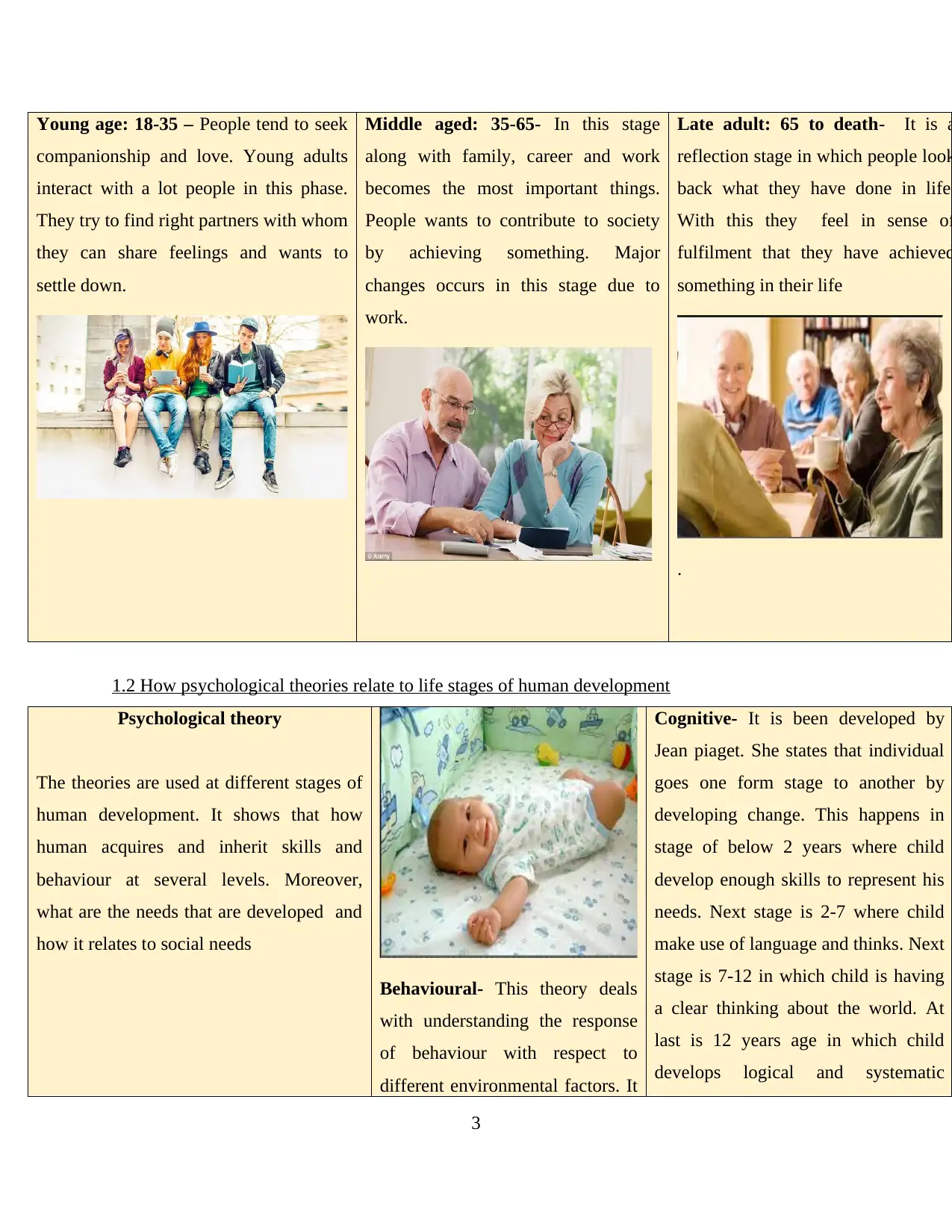
Young age: 18-35 – People tend to seek
companionship and love. Young adults
interact with a lot people in this phase.
They try to find right partners with whom
they can share feelings and wants to
settle down.
Middle aged: 35-65- In this stage
along with family, career and work
becomes the most important things.
People wants to contribute to society
by achieving something. Major
changes occurs in this stage due to
work.
Late adult: 65 to death- It is a
reflection stage in which people look
back what they have done in life.
With this they feel in sense of
fulfilment that they have achieved
something in their life
.
1.2 How psychological theories relate to life stages of human development
Psychological theory
The theories are used at different stages of
human development. It shows that how
human acquires and inherit skills and
behaviour at several levels. Moreover,
what are the needs that are developed and
how it relates to social needs
Behavioural- This theory deals
with understanding the response
of behaviour with respect to
different environmental factors. It
Cognitive- It is been developed by
Jean piaget. She states that individual
goes one form stage to another by
developing change. This happens in
stage of below 2 years where child
develop enough skills to represent his
needs. Next stage is 2-7 where child
make use of language and thinks. Next
stage is 7-12 in which child is having
a clear thinking about the world. At
last is 12 years age in which child
develops logical and systematic
3
companionship and love. Young adults
interact with a lot people in this phase.
They try to find right partners with whom
they can share feelings and wants to
settle down.
Middle aged: 35-65- In this stage
along with family, career and work
becomes the most important things.
People wants to contribute to society
by achieving something. Major
changes occurs in this stage due to
work.
Late adult: 65 to death- It is a
reflection stage in which people look
back what they have done in life.
With this they feel in sense of
fulfilment that they have achieved
something in their life
.
1.2 How psychological theories relate to life stages of human development
Psychological theory
The theories are used at different stages of
human development. It shows that how
human acquires and inherit skills and
behaviour at several levels. Moreover,
what are the needs that are developed and
how it relates to social needs
Behavioural- This theory deals
with understanding the response
of behaviour with respect to
different environmental factors. It
Cognitive- It is been developed by
Jean piaget. She states that individual
goes one form stage to another by
developing change. This happens in
stage of below 2 years where child
develop enough skills to represent his
needs. Next stage is 2-7 where child
make use of language and thinks. Next
stage is 7-12 in which child is having
a clear thinking about the world. At
last is 12 years age in which child
develops logical and systematic
3
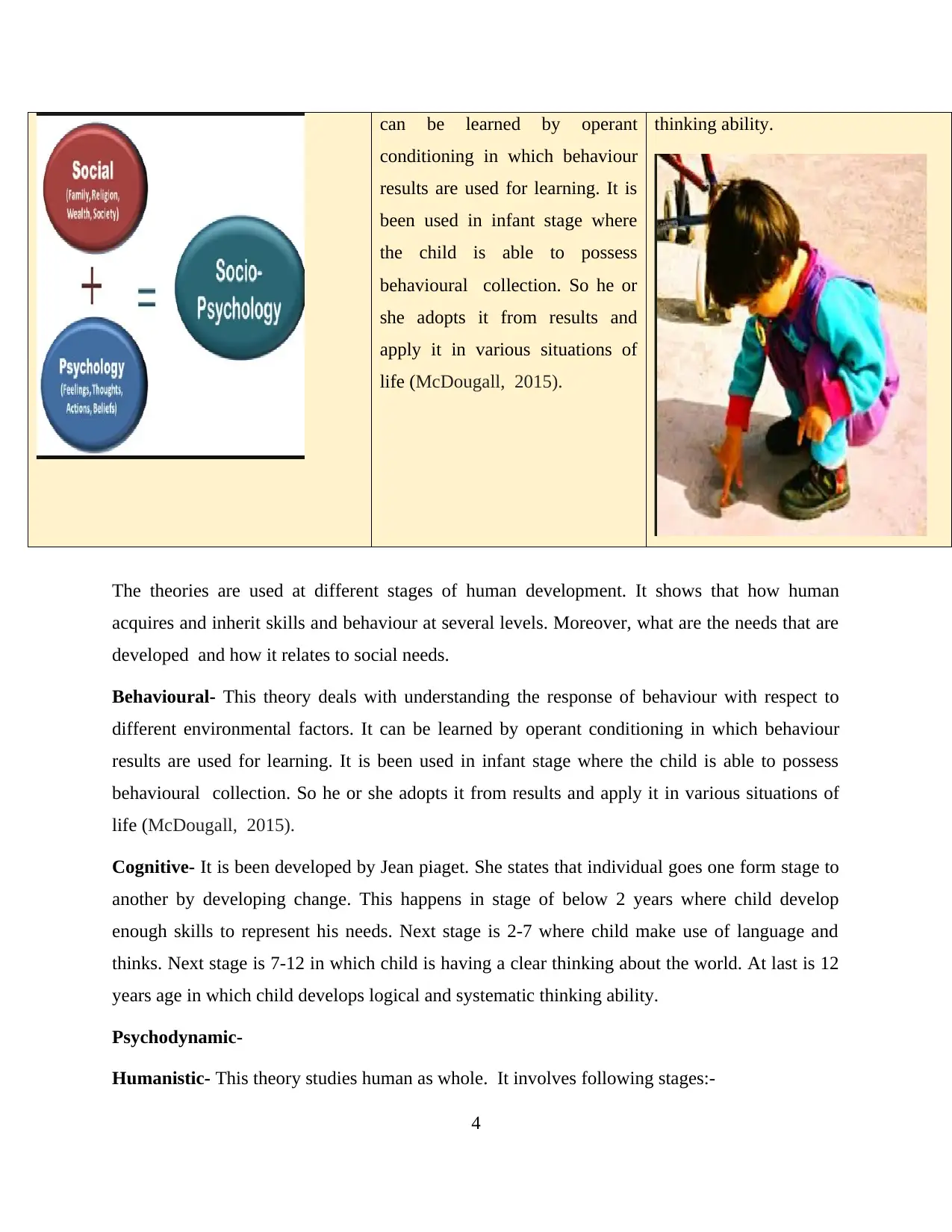
can be learned by operant
conditioning in which behaviour
results are used for learning. It is
been used in infant stage where
the child is able to possess
behavioural collection. So he or
she adopts it from results and
apply it in various situations of
life (McDougall, 2015).
thinking ability.
The theories are used at different stages of human development. It shows that how human
acquires and inherit skills and behaviour at several levels. Moreover, what are the needs that are
developed and how it relates to social needs.
Behavioural- This theory deals with understanding the response of behaviour with respect to
different environmental factors. It can be learned by operant conditioning in which behaviour
results are used for learning. It is been used in infant stage where the child is able to possess
behavioural collection. So he or she adopts it from results and apply it in various situations of
life (McDougall, 2015).
Cognitive- It is been developed by Jean piaget. She states that individual goes one form stage to
another by developing change. This happens in stage of below 2 years where child develop
enough skills to represent his needs. Next stage is 2-7 where child make use of language and
thinks. Next stage is 7-12 in which child is having a clear thinking about the world. At last is 12
years age in which child develops logical and systematic thinking ability.
Psychodynamic-
Humanistic- This theory studies human as whole. It involves following stages:-
4
conditioning in which behaviour
results are used for learning. It is
been used in infant stage where
the child is able to possess
behavioural collection. So he or
she adopts it from results and
apply it in various situations of
life (McDougall, 2015).
thinking ability.
The theories are used at different stages of human development. It shows that how human
acquires and inherit skills and behaviour at several levels. Moreover, what are the needs that are
developed and how it relates to social needs.
Behavioural- This theory deals with understanding the response of behaviour with respect to
different environmental factors. It can be learned by operant conditioning in which behaviour
results are used for learning. It is been used in infant stage where the child is able to possess
behavioural collection. So he or she adopts it from results and apply it in various situations of
life (McDougall, 2015).
Cognitive- It is been developed by Jean piaget. She states that individual goes one form stage to
another by developing change. This happens in stage of below 2 years where child develop
enough skills to represent his needs. Next stage is 2-7 where child make use of language and
thinks. Next stage is 7-12 in which child is having a clear thinking about the world. At last is 12
years age in which child develops logical and systematic thinking ability.
Psychodynamic-
Humanistic- This theory studies human as whole. It involves following stages:-
4
⊘ This is a preview!⊘
Do you want full access?
Subscribe today to unlock all pages.

Trusted by 1+ million students worldwide
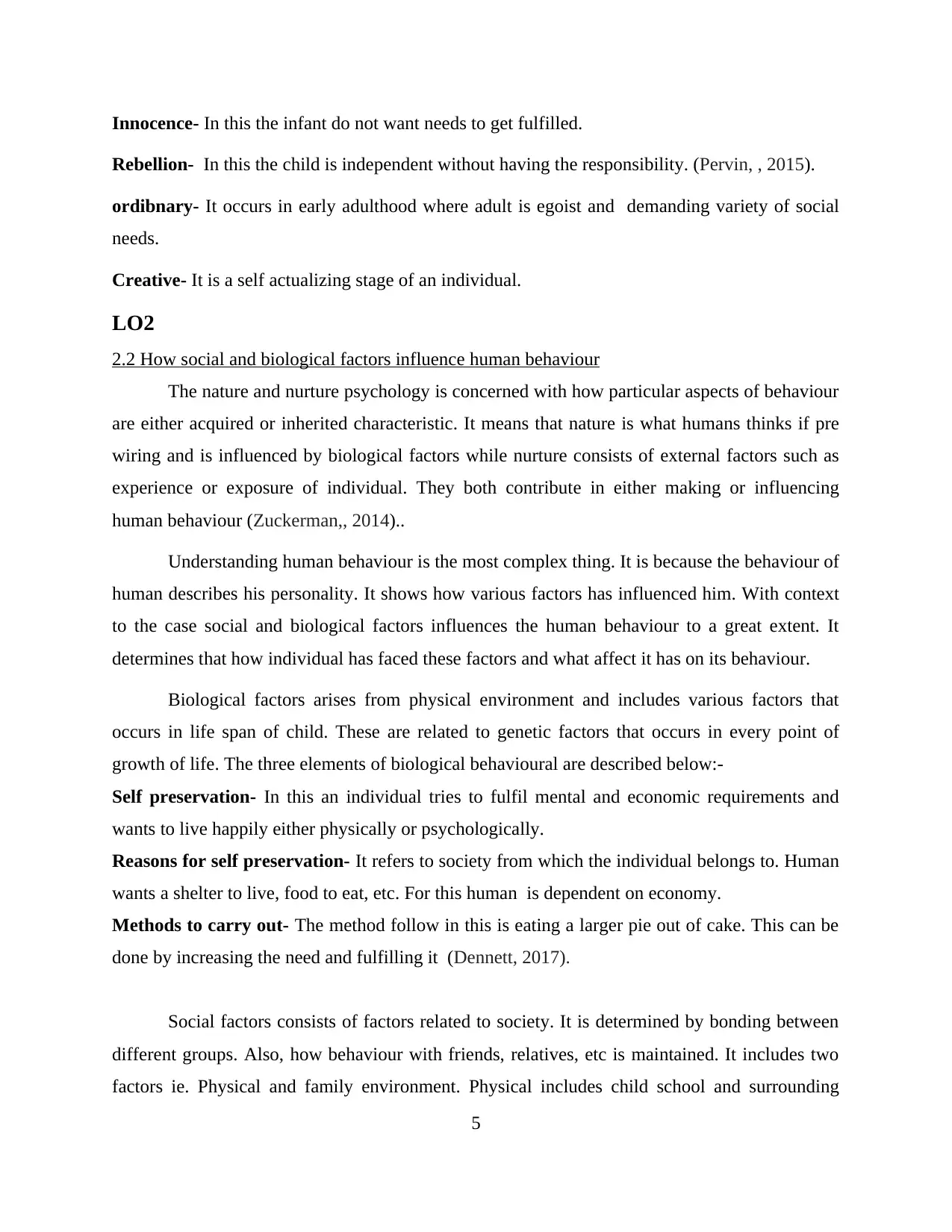
Innocence- In this the infant do not want needs to get fulfilled.
Rebellion- In this the child is independent without having the responsibility. (Pervin, , 2015).
ordibnary- It occurs in early adulthood where adult is egoist and demanding variety of social
needs.
Creative- It is a self actualizing stage of an individual.
LO2
2.2 How social and biological factors influence human behaviour
The nature and nurture psychology is concerned with how particular aspects of behaviour
are either acquired or inherited characteristic. It means that nature is what humans thinks if pre
wiring and is influenced by biological factors while nurture consists of external factors such as
experience or exposure of individual. They both contribute in either making or influencing
human behaviour (Zuckerman,, 2014)..
Understanding human behaviour is the most complex thing. It is because the behaviour of
human describes his personality. It shows how various factors has influenced him. With context
to the case social and biological factors influences the human behaviour to a great extent. It
determines that how individual has faced these factors and what affect it has on its behaviour.
Biological factors arises from physical environment and includes various factors that
occurs in life span of child. These are related to genetic factors that occurs in every point of
growth of life. The three elements of biological behavioural are described below:-
Self preservation- In this an individual tries to fulfil mental and economic requirements and
wants to live happily either physically or psychologically.
Reasons for self preservation- It refers to society from which the individual belongs to. Human
wants a shelter to live, food to eat, etc. For this human is dependent on economy.
Methods to carry out- The method follow in this is eating a larger pie out of cake. This can be
done by increasing the need and fulfilling it (Dennett, 2017).
Social factors consists of factors related to society. It is determined by bonding between
different groups. Also, how behaviour with friends, relatives, etc is maintained. It includes two
factors ie. Physical and family environment. Physical includes child school and surrounding
5
Rebellion- In this the child is independent without having the responsibility. (Pervin, , 2015).
ordibnary- It occurs in early adulthood where adult is egoist and demanding variety of social
needs.
Creative- It is a self actualizing stage of an individual.
LO2
2.2 How social and biological factors influence human behaviour
The nature and nurture psychology is concerned with how particular aspects of behaviour
are either acquired or inherited characteristic. It means that nature is what humans thinks if pre
wiring and is influenced by biological factors while nurture consists of external factors such as
experience or exposure of individual. They both contribute in either making or influencing
human behaviour (Zuckerman,, 2014)..
Understanding human behaviour is the most complex thing. It is because the behaviour of
human describes his personality. It shows how various factors has influenced him. With context
to the case social and biological factors influences the human behaviour to a great extent. It
determines that how individual has faced these factors and what affect it has on its behaviour.
Biological factors arises from physical environment and includes various factors that
occurs in life span of child. These are related to genetic factors that occurs in every point of
growth of life. The three elements of biological behavioural are described below:-
Self preservation- In this an individual tries to fulfil mental and economic requirements and
wants to live happily either physically or psychologically.
Reasons for self preservation- It refers to society from which the individual belongs to. Human
wants a shelter to live, food to eat, etc. For this human is dependent on economy.
Methods to carry out- The method follow in this is eating a larger pie out of cake. This can be
done by increasing the need and fulfilling it (Dennett, 2017).
Social factors consists of factors related to society. It is determined by bonding between
different groups. Also, how behaviour with friends, relatives, etc is maintained. It includes two
factors ie. Physical and family environment. Physical includes child school and surrounding
5
Paraphrase This Document
Need a fresh take? Get an instant paraphrase of this document with our AI Paraphraser
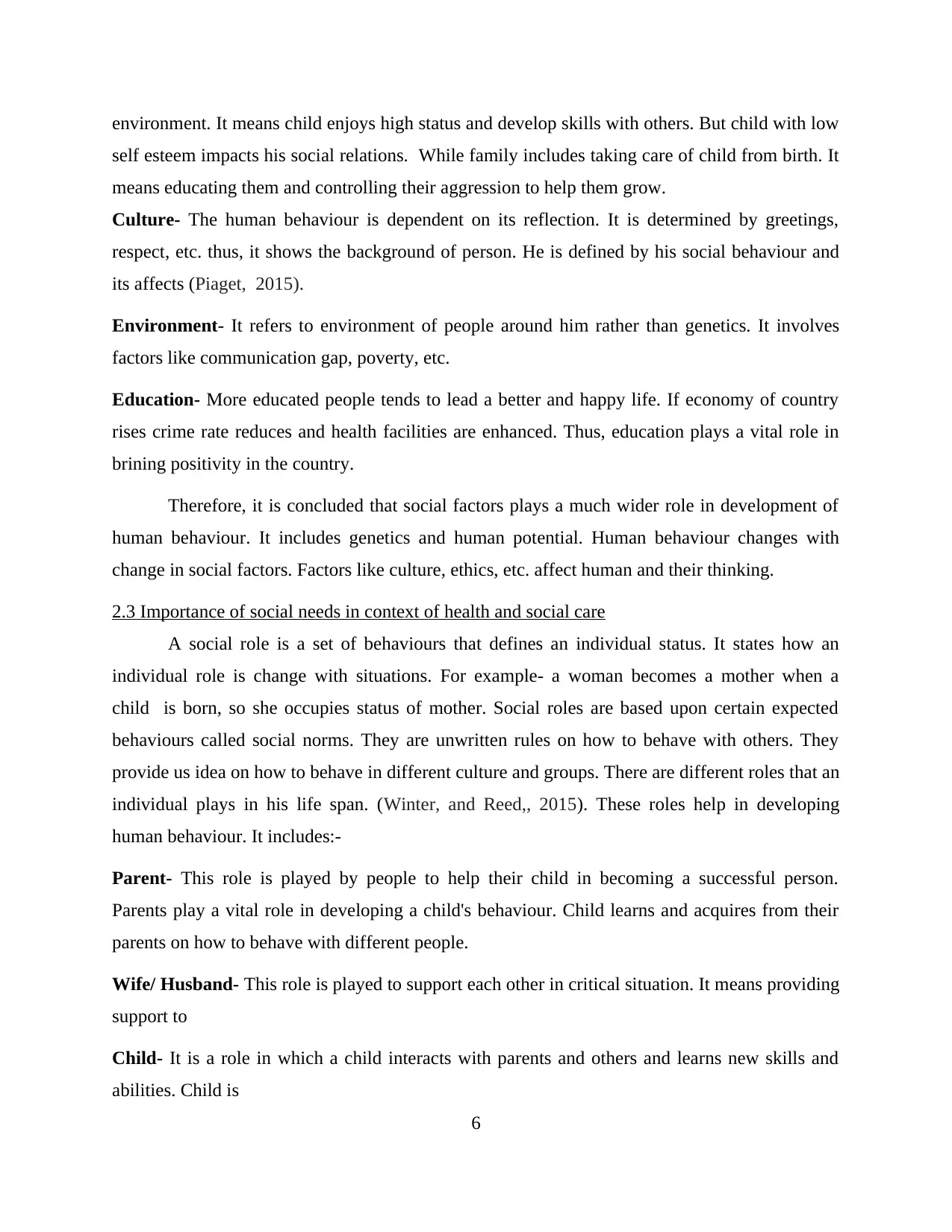
environment. It means child enjoys high status and develop skills with others. But child with low
self esteem impacts his social relations. While family includes taking care of child from birth. It
means educating them and controlling their aggression to help them grow.
Culture- The human behaviour is dependent on its reflection. It is determined by greetings,
respect, etc. thus, it shows the background of person. He is defined by his social behaviour and
its affects (Piaget, 2015).
Environment- It refers to environment of people around him rather than genetics. It involves
factors like communication gap, poverty, etc.
Education- More educated people tends to lead a better and happy life. If economy of country
rises crime rate reduces and health facilities are enhanced. Thus, education plays a vital role in
brining positivity in the country.
Therefore, it is concluded that social factors plays a much wider role in development of
human behaviour. It includes genetics and human potential. Human behaviour changes with
change in social factors. Factors like culture, ethics, etc. affect human and their thinking.
2.3 Importance of social needs in context of health and social care
A social role is a set of behaviours that defines an individual status. It states how an
individual role is change with situations. For example- a woman becomes a mother when a
child is born, so she occupies status of mother. Social roles are based upon certain expected
behaviours called social norms. They are unwritten rules on how to behave with others. They
provide us idea on how to behave in different culture and groups. There are different roles that an
individual plays in his life span. (Winter, and Reed,, 2015). These roles help in developing
human behaviour. It includes:-
Parent- This role is played by people to help their child in becoming a successful person.
Parents play a vital role in developing a child's behaviour. Child learns and acquires from their
parents on how to behave with different people.
Wife/ Husband- This role is played to support each other in critical situation. It means providing
support to
Child- It is a role in which a child interacts with parents and others and learns new skills and
abilities. Child is
6
self esteem impacts his social relations. While family includes taking care of child from birth. It
means educating them and controlling their aggression to help them grow.
Culture- The human behaviour is dependent on its reflection. It is determined by greetings,
respect, etc. thus, it shows the background of person. He is defined by his social behaviour and
its affects (Piaget, 2015).
Environment- It refers to environment of people around him rather than genetics. It involves
factors like communication gap, poverty, etc.
Education- More educated people tends to lead a better and happy life. If economy of country
rises crime rate reduces and health facilities are enhanced. Thus, education plays a vital role in
brining positivity in the country.
Therefore, it is concluded that social factors plays a much wider role in development of
human behaviour. It includes genetics and human potential. Human behaviour changes with
change in social factors. Factors like culture, ethics, etc. affect human and their thinking.
2.3 Importance of social needs in context of health and social care
A social role is a set of behaviours that defines an individual status. It states how an
individual role is change with situations. For example- a woman becomes a mother when a
child is born, so she occupies status of mother. Social roles are based upon certain expected
behaviours called social norms. They are unwritten rules on how to behave with others. They
provide us idea on how to behave in different culture and groups. There are different roles that an
individual plays in his life span. (Winter, and Reed,, 2015). These roles help in developing
human behaviour. It includes:-
Parent- This role is played by people to help their child in becoming a successful person.
Parents play a vital role in developing a child's behaviour. Child learns and acquires from their
parents on how to behave with different people.
Wife/ Husband- This role is played to support each other in critical situation. It means providing
support to
Child- It is a role in which a child interacts with parents and others and learns new skills and
abilities. Child is
6
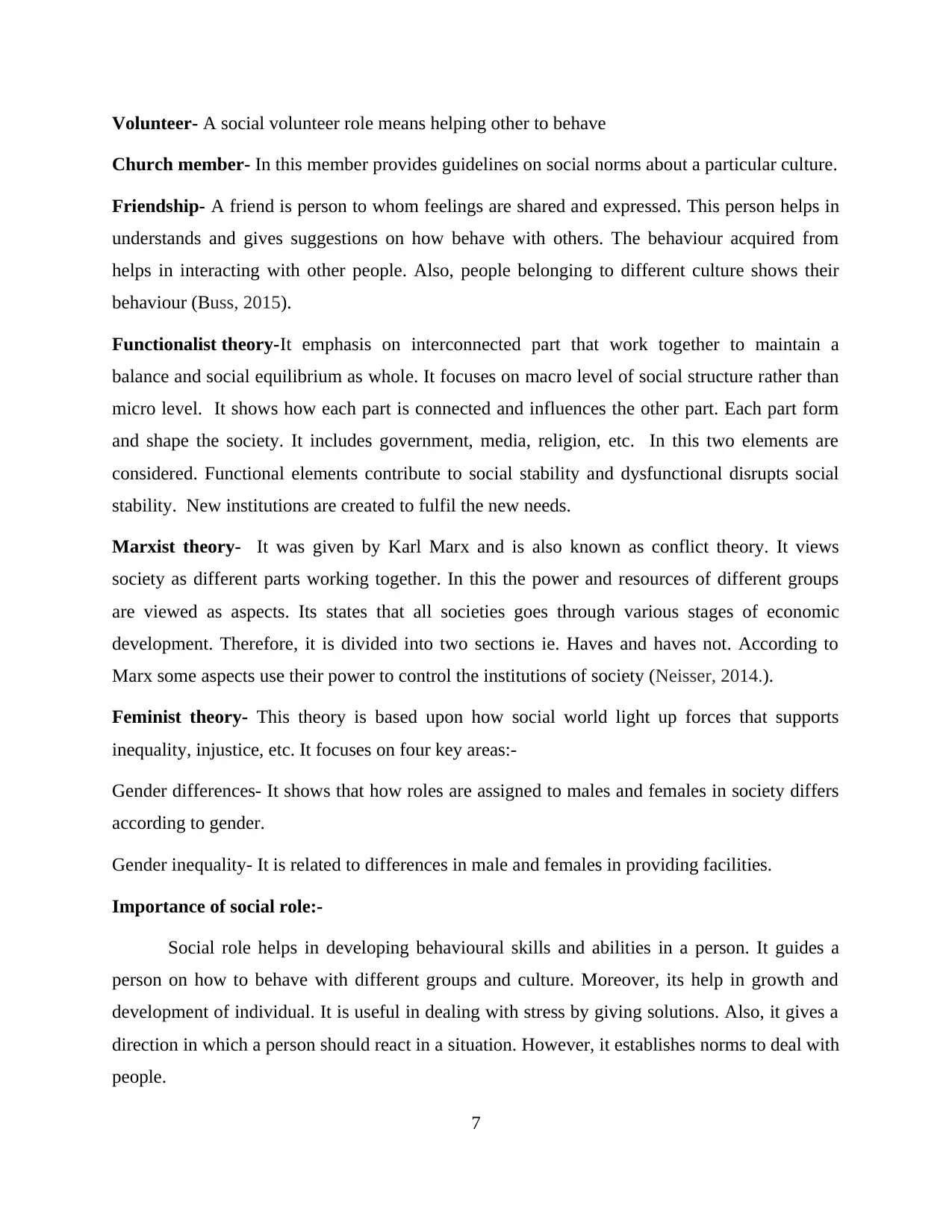
Volunteer- A social volunteer role means helping other to behave
Church member- In this member provides guidelines on social norms about a particular culture.
Friendship- A friend is person to whom feelings are shared and expressed. This person helps in
understands and gives suggestions on how behave with others. The behaviour acquired from
helps in interacting with other people. Also, people belonging to different culture shows their
behaviour (Buss, 2015).
Functionalist theory-It emphasis on interconnected part that work together to maintain a
balance and social equilibrium as whole. It focuses on macro level of social structure rather than
micro level. It shows how each part is connected and influences the other part. Each part form
and shape the society. It includes government, media, religion, etc. In this two elements are
considered. Functional elements contribute to social stability and dysfunctional disrupts social
stability. New institutions are created to fulfil the new needs.
Marxist theory- It was given by Karl Marx and is also known as conflict theory. It views
society as different parts working together. In this the power and resources of different groups
are viewed as aspects. Its states that all societies goes through various stages of economic
development. Therefore, it is divided into two sections ie. Haves and haves not. According to
Marx some aspects use their power to control the institutions of society (Neisser, 2014.).
Feminist theory- This theory is based upon how social world light up forces that supports
inequality, injustice, etc. It focuses on four key areas:-
Gender differences- It shows that how roles are assigned to males and females in society differs
according to gender.
Gender inequality- It is related to differences in male and females in providing facilities.
Importance of social role:-
Social role helps in developing behavioural skills and abilities in a person. It guides a
person on how to behave with different groups and culture. Moreover, its help in growth and
development of individual. It is useful in dealing with stress by giving solutions. Also, it gives a
direction in which a person should react in a situation. However, it establishes norms to deal with
people.
7
Church member- In this member provides guidelines on social norms about a particular culture.
Friendship- A friend is person to whom feelings are shared and expressed. This person helps in
understands and gives suggestions on how behave with others. The behaviour acquired from
helps in interacting with other people. Also, people belonging to different culture shows their
behaviour (Buss, 2015).
Functionalist theory-It emphasis on interconnected part that work together to maintain a
balance and social equilibrium as whole. It focuses on macro level of social structure rather than
micro level. It shows how each part is connected and influences the other part. Each part form
and shape the society. It includes government, media, religion, etc. In this two elements are
considered. Functional elements contribute to social stability and dysfunctional disrupts social
stability. New institutions are created to fulfil the new needs.
Marxist theory- It was given by Karl Marx and is also known as conflict theory. It views
society as different parts working together. In this the power and resources of different groups
are viewed as aspects. Its states that all societies goes through various stages of economic
development. Therefore, it is divided into two sections ie. Haves and haves not. According to
Marx some aspects use their power to control the institutions of society (Neisser, 2014.).
Feminist theory- This theory is based upon how social world light up forces that supports
inequality, injustice, etc. It focuses on four key areas:-
Gender differences- It shows that how roles are assigned to males and females in society differs
according to gender.
Gender inequality- It is related to differences in male and females in providing facilities.
Importance of social role:-
Social role helps in developing behavioural skills and abilities in a person. It guides a
person on how to behave with different groups and culture. Moreover, its help in growth and
development of individual. It is useful in dealing with stress by giving solutions. Also, it gives a
direction in which a person should react in a situation. However, it establishes norms to deal with
people.
7
⊘ This is a preview!⊘
Do you want full access?
Subscribe today to unlock all pages.

Trusted by 1+ million students worldwide

LO3
8
8
Paraphrase This Document
Need a fresh take? Get an instant paraphrase of this document with our AI Paraphraser
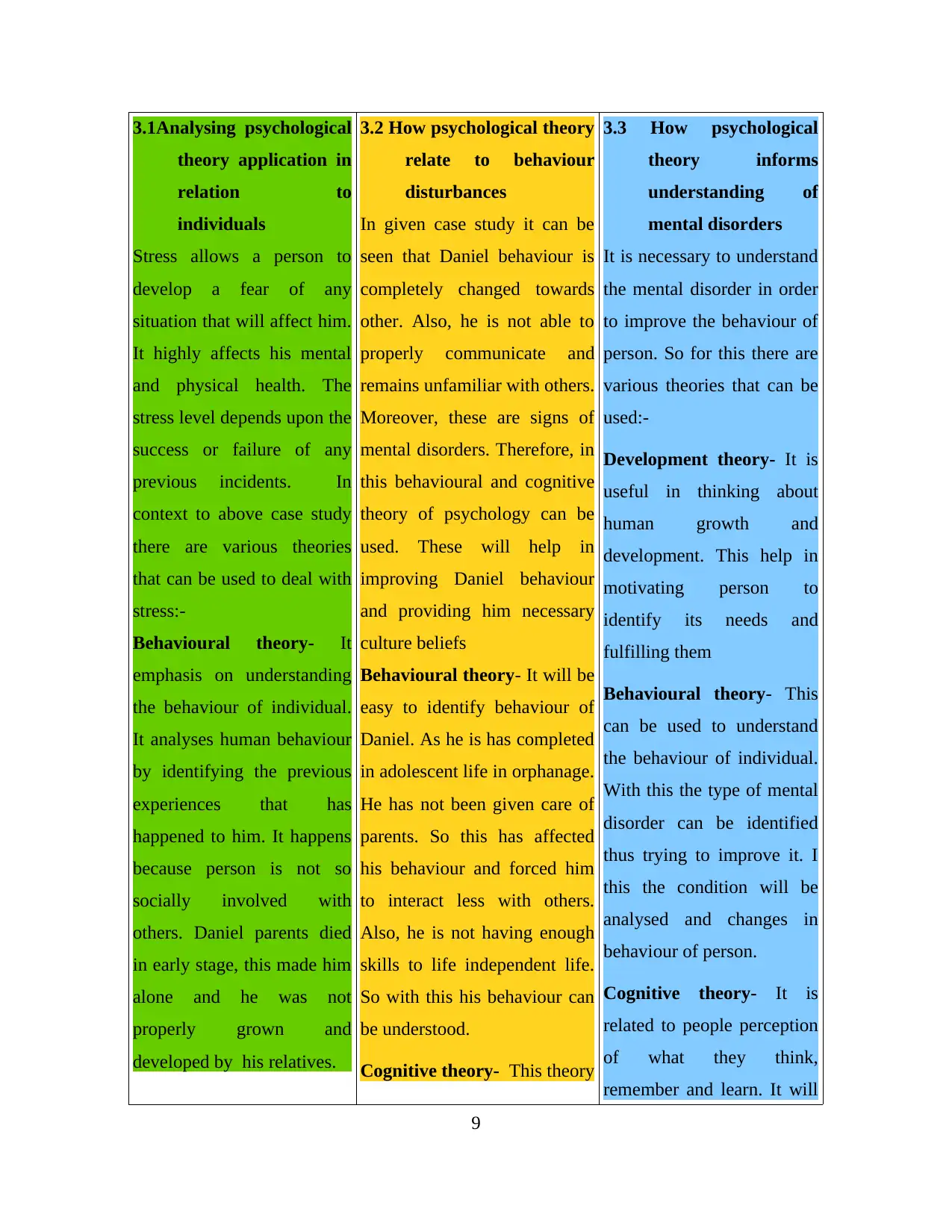
3.1Analysing psychological
theory application in
relation to
individuals
Stress allows a person to
develop a fear of any
situation that will affect him.
It highly affects his mental
and physical health. The
stress level depends upon the
success or failure of any
previous incidents. In
context to above case study
there are various theories
that can be used to deal with
stress:-
Behavioural theory- It
emphasis on understanding
the behaviour of individual.
It analyses human behaviour
by identifying the previous
experiences that has
happened to him. It happens
because person is not so
socially involved with
others. Daniel parents died
in early stage, this made him
alone and he was not
properly grown and
developed by his relatives.
3.2 How psychological theory
relate to behaviour
disturbances
In given case study it can be
seen that Daniel behaviour is
completely changed towards
other. Also, he is not able to
properly communicate and
remains unfamiliar with others.
Moreover, these are signs of
mental disorders. Therefore, in
this behavioural and cognitive
theory of psychology can be
used. These will help in
improving Daniel behaviour
and providing him necessary
culture beliefs
Behavioural theory- It will be
easy to identify behaviour of
Daniel. As he is has completed
in adolescent life in orphanage.
He has not been given care of
parents. So this has affected
his behaviour and forced him
to interact less with others.
Also, he is not having enough
skills to life independent life.
So with this his behaviour can
be understood.
Cognitive theory- This theory
3.3 How psychological
theory informs
understanding of
mental disorders
It is necessary to understand
the mental disorder in order
to improve the behaviour of
person. So for this there are
various theories that can be
used:-
Development theory- It is
useful in thinking about
human growth and
development. This help in
motivating person to
identify its needs and
fulfilling them
Behavioural theory- This
can be used to understand
the behaviour of individual.
With this the type of mental
disorder can be identified
thus trying to improve it. I
this the condition will be
analysed and changes in
behaviour of person.
Cognitive theory- It is
related to people perception
of what they think,
remember and learn. It will
9
theory application in
relation to
individuals
Stress allows a person to
develop a fear of any
situation that will affect him.
It highly affects his mental
and physical health. The
stress level depends upon the
success or failure of any
previous incidents. In
context to above case study
there are various theories
that can be used to deal with
stress:-
Behavioural theory- It
emphasis on understanding
the behaviour of individual.
It analyses human behaviour
by identifying the previous
experiences that has
happened to him. It happens
because person is not so
socially involved with
others. Daniel parents died
in early stage, this made him
alone and he was not
properly grown and
developed by his relatives.
3.2 How psychological theory
relate to behaviour
disturbances
In given case study it can be
seen that Daniel behaviour is
completely changed towards
other. Also, he is not able to
properly communicate and
remains unfamiliar with others.
Moreover, these are signs of
mental disorders. Therefore, in
this behavioural and cognitive
theory of psychology can be
used. These will help in
improving Daniel behaviour
and providing him necessary
culture beliefs
Behavioural theory- It will be
easy to identify behaviour of
Daniel. As he is has completed
in adolescent life in orphanage.
He has not been given care of
parents. So this has affected
his behaviour and forced him
to interact less with others.
Also, he is not having enough
skills to life independent life.
So with this his behaviour can
be understood.
Cognitive theory- This theory
3.3 How psychological
theory informs
understanding of
mental disorders
It is necessary to understand
the mental disorder in order
to improve the behaviour of
person. So for this there are
various theories that can be
used:-
Development theory- It is
useful in thinking about
human growth and
development. This help in
motivating person to
identify its needs and
fulfilling them
Behavioural theory- This
can be used to understand
the behaviour of individual.
With this the type of mental
disorder can be identified
thus trying to improve it. I
this the condition will be
analysed and changes in
behaviour of person.
Cognitive theory- It is
related to people perception
of what they think,
remember and learn. It will
9
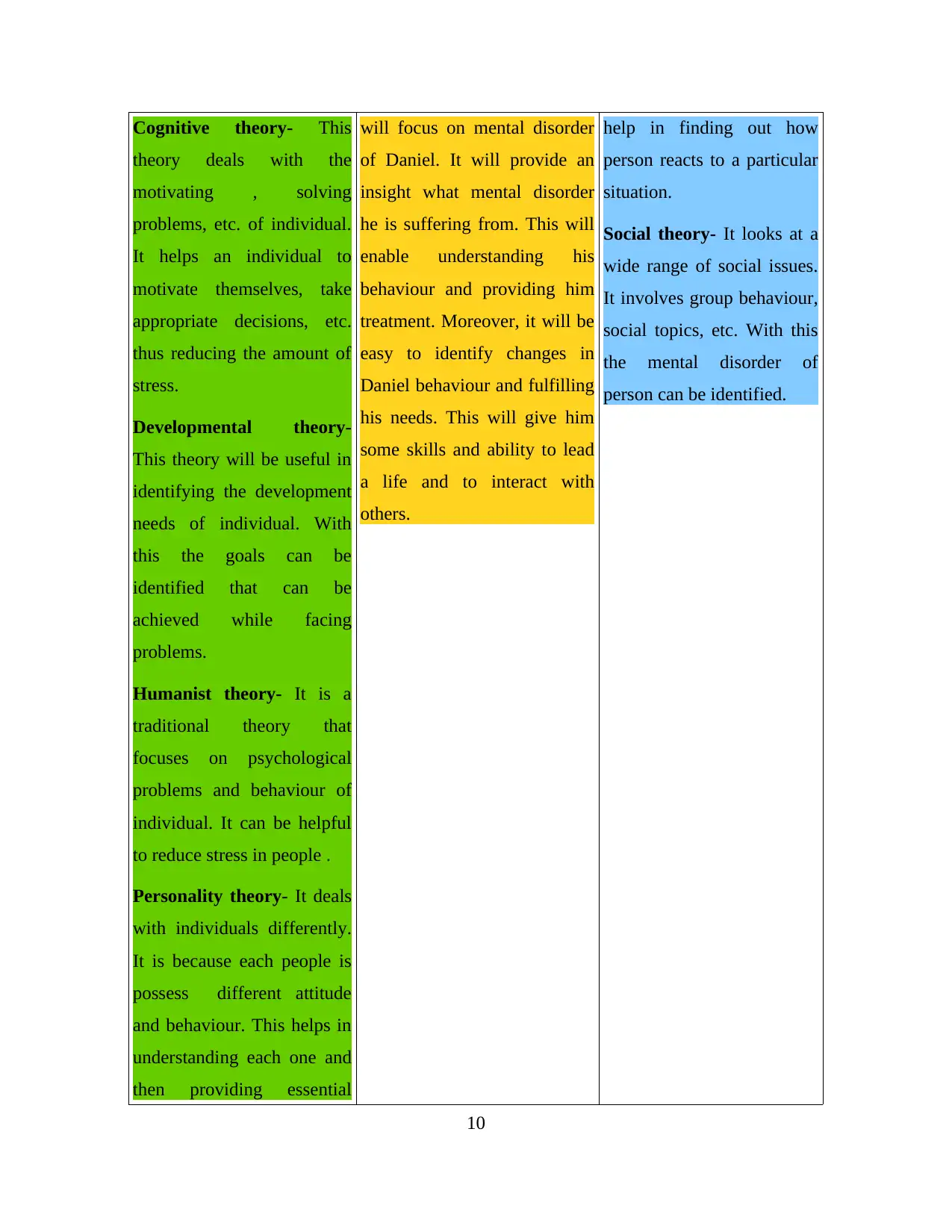
Cognitive theory- This
theory deals with the
motivating , solving
problems, etc. of individual.
It helps an individual to
motivate themselves, take
appropriate decisions, etc.
thus reducing the amount of
stress.
Developmental theory-
This theory will be useful in
identifying the development
needs of individual. With
this the goals can be
identified that can be
achieved while facing
problems.
Humanist theory- It is a
traditional theory that
focuses on psychological
problems and behaviour of
individual. It can be helpful
to reduce stress in people .
Personality theory- It deals
with individuals differently.
It is because each people is
possess different attitude
and behaviour. This helps in
understanding each one and
then providing essential
will focus on mental disorder
of Daniel. It will provide an
insight what mental disorder
he is suffering from. This will
enable understanding his
behaviour and providing him
treatment. Moreover, it will be
easy to identify changes in
Daniel behaviour and fulfilling
his needs. This will give him
some skills and ability to lead
a life and to interact with
others.
help in finding out how
person reacts to a particular
situation.
Social theory- It looks at a
wide range of social issues.
It involves group behaviour,
social topics, etc. With this
the mental disorder of
person can be identified.
10
theory deals with the
motivating , solving
problems, etc. of individual.
It helps an individual to
motivate themselves, take
appropriate decisions, etc.
thus reducing the amount of
stress.
Developmental theory-
This theory will be useful in
identifying the development
needs of individual. With
this the goals can be
identified that can be
achieved while facing
problems.
Humanist theory- It is a
traditional theory that
focuses on psychological
problems and behaviour of
individual. It can be helpful
to reduce stress in people .
Personality theory- It deals
with individuals differently.
It is because each people is
possess different attitude
and behaviour. This helps in
understanding each one and
then providing essential
will focus on mental disorder
of Daniel. It will provide an
insight what mental disorder
he is suffering from. This will
enable understanding his
behaviour and providing him
treatment. Moreover, it will be
easy to identify changes in
Daniel behaviour and fulfilling
his needs. This will give him
some skills and ability to lead
a life and to interact with
others.
help in finding out how
person reacts to a particular
situation.
Social theory- It looks at a
wide range of social issues.
It involves group behaviour,
social topics, etc. With this
the mental disorder of
person can be identified.
10
⊘ This is a preview!⊘
Do you want full access?
Subscribe today to unlock all pages.

Trusted by 1+ million students worldwide
1 out of 20
Related Documents
Your All-in-One AI-Powered Toolkit for Academic Success.
+13062052269
info@desklib.com
Available 24*7 on WhatsApp / Email
![[object Object]](/_next/static/media/star-bottom.7253800d.svg)
Unlock your academic potential
Copyright © 2020–2026 A2Z Services. All Rights Reserved. Developed and managed by ZUCOL.





